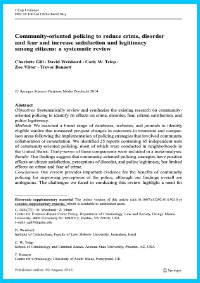By: Charlotte Gill, David Weisburd, Cody W. Telep, Zoe Vitter & Trevor Bennett
Objectives Systematically review and synthesize the existing research on community-oriented policing to identify its effects on crime, disorder, fear, citizen satisfaction, and police legitimacy.
Methods We searched a broad range of databases, websites, and journals to identify eligible studies that measured pre-post changes in outcomes in treatment and comparison areas following the implementation of policing strategies that involved community collaboration or consultation. We identified 25 reports containing 65 independent tests of community-oriented policing, most of which were conducted in neighborhoods in the United States. Thirty-seven of these comparisons were included in a meta-analysis.
Results Our findings suggest that community-oriented policing strategies have positive effects on citizen satisfaction, perceptions of disorder, and police legitimacy, but limited effects on crime and fear of crime.
Conclusions Our review provides important evidence for the benefits of community policing for improving perceptions of the police, although our findings overall are ambiguous. The challenges we faced in conducting this review highlight a need for further research and theory development around community policing. In particular, there is a need to explicate and test a logic model that explains how short-term benefits of community policing, like improved citizen satisfaction, relate to longer-term crime prevention effects, and to identify the policing strategies that benefit most from community participation.
J Exp Criminol DOI 10.1007/s11292-014-9210-y


